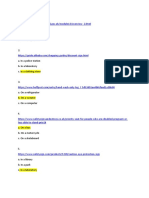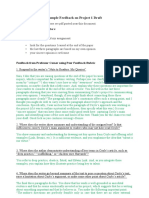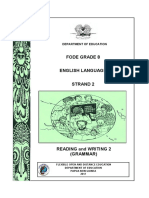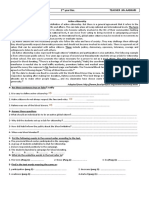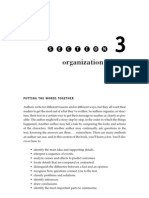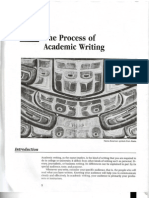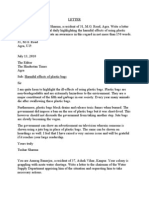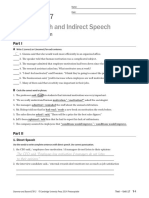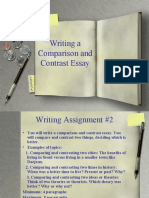Uts Bip
Uts Bip
Uploaded by
Fikha AulliaCopyright:
Available Formats
Uts Bip
Uts Bip
Uploaded by
Fikha AulliaOriginal Description:
Original Title
Copyright
Available Formats
Share this document
Did you find this document useful?
Is this content inappropriate?
Copyright:
Available Formats
Uts Bip
Uts Bip
Uploaded by
Fikha AulliaCopyright:
Available Formats
Bahasa Inggris Profesi
UTS
I.
Read each question and underline the key words. Then scan the following car
advertisement to find the correct answers. Work quickly!
1. What is the cheapest car in this ad?
2. Which cars have power windows?
3. How many super cabs are available?
4. Does the Escape Wagon have power steering?
5. Can college graduates get a rebate for all the cars in this ad?
6. For which cars can you get a Daniel Discount?
7. Which car has cash back?
8. Which car has an original list price of $22,790?
9. How many cars have cassette players?
10. In what town is Daniel Ford located?
II.
Read these questions and then skim the following magazine article for the
answers. Work as quickly as you canno more than two minutes for the
skimming.
1.
2.
3.
4.
5.
What does the writer mean by the title?
What does she think about the Internet? How can you tell?
Have you ever read or talked about this issue before?
According to the article, how do educators feel about this issue?
What do you think about this issue? Do you agree or disagree with the writer?
Will the Net Replace Thinking?
by Laura Sessions Stepp
It is 2 A.M. and Daniel Davis, a
first-year University of Maryland student,
has not even started his English paper on
biological warfare, due that day.
No problem. Hell lust do what he
has done before a dozen times or more. He
sits down at his computer in his dorm
room, signs on to Yahoos search engine,
and begins his quest. Six hours and several
bags of chips later, the paper pops out of
his printer, complete.
He doesnt consider visiting the
campus library or opening a book. You
can find whole pages of stuff you need to
know on the Web, fast, he says.
So Davis is a procrastinator. So
what? Professors are used to that. But six
hours? Thats a whole new kind of
extreme.
Welcome to the world of Net
thinking, a form of reasoning that
characterizes many students who are
growing up with the internet as their
primary, and in some cases, sole source of
research. Ask teachers and theyll tell you:
Among all the influences that shape young
thinking skills, computer technology is the
biggest one.
__________________________________
Net thinkers at school appear to
value breadth over depth and other
peoples arguments over their own.
__________________________________
Students first recourse for any kind
of information is the Web. Its absolutely
automatic, says Kenneth Kotovsky, a
psychology professor at Carnegie-Mellon
University in Pittsburgh who has examined
the study habits of young people.
Good? Bad? Who knows? The first
popular Internet browser, Netscape, came
out only about a decade ago. What we do
know after millennia of training minds in
scholarly disciplines is that something has
changed and its not apt to change back.
On the good side, Net thinkers are
said to generate work quickly and make
connections easily. They are more in
control of facts than we were 40 years
ago, says Bernard Cooperman, a history
professor at the University of Maryland.
But they also value information-gathering
over deliberation, breadth over depth, and
other peoples arguments over their own.
This has educators worried.
Seven years ago, I was writing
about the promise of digital resources,
says Jamie McKenzie, a former school
superintendent and library director who
now publishes an e-zine on educational
technology. I have to say Ive been
disappointed. The quality of information
on the Internet is below what you find in
print, and the Internet has fostered a
thinner, less substantial thinking.
The problem is no longer plagiarism
of huge downloaded blocks of text
software can detect that now, when a
teacher enters a few lines of a paper. The
concern is the Internet itself.
Marylaine Block, a librarian and
Internet trainer in Iowa, is blunt: The
Internet makes it ungodly easy now for
people who wish to be lazy.
Jeffrey Meikle, chairman of the
American studies department at the
University of Texas, sees the new world
every time he walks into the main library
on the Austin campus. There, where the
card catalogue used to be, sit banks of
computer terminals.
My students are as intelligent and
hard working as ever, he says, but they
wouldnt go to the library if there werent
all those terminals. All Web resources are
not equal, of course. What aficionados call
the deep Web, including subscription
services such as Nexis and JSTOR,
enables students to find information that is
accurate, thorough and wide-ranging.
I think the Internet encourages
intellectual thinking, says Nora Flynn, a
third-year strident at Maryland. You can
go to so many sources, find things you
never heard of. It forces me to think
globally.
But many students dont have access
to these costly, sophisticated resources or
dont know how to use them. This leaves
them relying on the free Web, a dangerous
place to be without a guide.
Anyone can post anything on the
free Web, and anyone frequently does. A
student who typed Thomas Jefferson
into the Google search engine would get
1.29 million hits; Eminem would bring up
1.37 million. Narrowing ones search to
certain words may not help. The gamelike
quality of screen and mouse encourages
students to sample these sources rather
than select an appropriate text and read
deeply into it or follow an argument to its
conclusion. The result is what Cooperman
calls cocktail-party knowledge.
Hes the model of a man of books:
short-sleeve shirts, glasses, slight stoop, a
pensive air. The Web is designed for the
masses, he says. It never presents
students with classically constructed
arguments, just facts and pictures.
Many students today will advance an
argument, he continues, then find
themselves unable to make it
convincingly. Is that a function of the
Web, or being inundated with information,
or the way were educating them in
general?
The Net has a kind of magical
quality that leads younger students to say
to librarians such as Block, It has to be
true. fit werent true, they wouldnt let it
be there.
Says Block, I have to tell them
there is no they.
III. Read the conversation. Infer answers to the questions below and discuss them with
another student.
A: Is this the kind of thing youre looking for?
B: Its hard to tell. You see, shes got very definite ideas about what she likes.
A: How about a nice little item like this?
B: Hmmm. Youd think Id know by now, but every year I have the same problem!
Those do look nice, but theyre a bit too old-fashioned. She doesnt think of herself
that way.
A: Then what about these. Theyre more classic.
B: No, no. Shes not the classic type. Something more modern . . . like those over there.
A: The ones with all the colors? We usually sell those to, well . . . to younger women.
B: Shes fond of color. Always has been. Says Im so dull in my business clothes...
A: Shall I gift wrap them?
B: No, thats not necessary. Ill just put the box in my pocket.
1.
Where are these people?
3. What did B put in his pocket?
2.
What are they talking about?
4. How old is B?
IV.
Choose items from (i) and from (ii) to complete these sentences in an appropriate
way. Note the punctuation at the ends of the sentences and phrases already given.
i
ii
when
though
at that time
the acting was superb
he was working as a librarian
I was still late for work
we met each other
the snow began to fall
before
by contrast
he began his story
then
nevertheless
Cuba has increased production by 35%
1. The world output of sugar has been in slow decline since 1984. By contrast, Cuba
has increased production by 35 %.
2. Redford published his first novel in 1968.
3. The story told in the film was predictable,
4. He was working in the garden
5. We had lived in the same block of flats for 5 years
6. I got up very early.
7. He waited until the audience was silent.
You might also like
- Broken 8th Feel PDFDocument6 pagesBroken 8th Feel PDFarjun100% (2)
- Ovando, C.J. Et. Al. Bilingual & ESL Classrooms-Teaching in Multicultural ContextsDocument6 pagesOvando, C.J. Et. Al. Bilingual & ESL Classrooms-Teaching in Multicultural ContextsOlga KardashNo ratings yet
- Determination of A Solubility Product Constant Lab 19C: Michelle Finkle Kenna Hunter MR Read April 12 2019Document11 pagesDetermination of A Solubility Product Constant Lab 19C: Michelle Finkle Kenna Hunter MR Read April 12 2019吳恩No ratings yet
- CourseOutline ReadingandWriting 2 PDFDocument10 pagesCourseOutline ReadingandWriting 2 PDFdaashkaNo ratings yet
- ETL Design TemplateDocument14 pagesETL Design TemplateachvmNo ratings yet
- Week 8 s2 Reading Writing Mock TestDocument6 pagesWeek 8 s2 Reading Writing Mock TestNg phwNo ratings yet
- Islam - 300984396 - LETS UNPLUG THE DIGITAL CLASSROOM - Writing - Ass#2Document5 pagesIslam - 300984396 - LETS UNPLUG THE DIGITAL CLASSROOM - Writing - Ass#2Syed Foysol IslamNo ratings yet
- Olympic 2013Document14 pagesOlympic 2013Thủy TiênNo ratings yet
- Icfes InglesDocument13 pagesIcfes Inglesgabriela rocha haddadNo ratings yet
- Date Schedule H.W Test Score NoteDocument86 pagesDate Schedule H.W Test Score Note閔聖雅100% (1)
- Resume Peer ReviewDocument1 pageResume Peer ReviewYegTinaNo ratings yet
- Azar Workbook Review With AnswersDocument8 pagesAzar Workbook Review With AnswersGabriela TorresNo ratings yet
- Complete FCE - U3L2 - Essay Type 2Document2 pagesComplete FCE - U3L2 - Essay Type 2Julie NguyenNo ratings yet
- DT Comment KeyDocument7 pagesDT Comment Keyvivianmarik259No ratings yet
- Sample Feedback Critical Review Draft 2Document2 pagesSample Feedback Critical Review Draft 2José Ernesto Alonso100% (2)
- The Secret of SuccessDocument1 pageThe Secret of SuccessQuinn KelseyNo ratings yet
- Teacher Resource Book Masters Academic W PDFDocument267 pagesTeacher Resource Book Masters Academic W PDF戏游No ratings yet
- Course Syllabus Aa ReadingDocument9 pagesCourse Syllabus Aa Readingapi-297204727No ratings yet
- Fode Grade 8 English Language Strand 2: Department of EducationDocument138 pagesFode Grade 8 English Language Strand 2: Department of EducationBernardita Erames GutibNo ratings yet
- UNIT 7 Reading ComprehensionDocument1 pageUNIT 7 Reading ComprehensionAabkari SalahNo ratings yet
- S3 - Lesson 13 (Main Idea and Supporting Details)Document10 pagesS3 - Lesson 13 (Main Idea and Supporting Details)Muhammad Harist Murdani0% (1)
- Writing Academic English001Document14 pagesWriting Academic English001gchoaNo ratings yet
- Fadilla - 1032011004 BINGDocument4 pagesFadilla - 1032011004 BINGFadilla141002No ratings yet
- Prepping For The TSI Mathematics Accuplacer A Guide To Better Prepare Students For The Texas Success Initiative Assessment Mathematics AccuplacerDocument68 pagesPrepping For The TSI Mathematics Accuplacer A Guide To Better Prepare Students For The Texas Success Initiative Assessment Mathematics AccuplacerAugust HornNo ratings yet
- Lasers in Modern Medicine Reading Ex l5Document3 pagesLasers in Modern Medicine Reading Ex l5Rasha YusufNo ratings yet
- Listening and Reading Skills.Document15 pagesListening and Reading Skills.Lavanya KawaleNo ratings yet
- Ged Written Essay - DaonDocument7 pagesGed Written Essay - DaonKeny100% (1)
- Hassan Nouns PracticeDocument5 pagesHassan Nouns PracticeIsaac EscobedoNo ratings yet
- Types of Sentences in Academic WritingDocument37 pagesTypes of Sentences in Academic WritingsaadNo ratings yet
- Refining Composition Skills Ch. 12 (253-280) PDFDocument28 pagesRefining Composition Skills Ch. 12 (253-280) PDFAffan Elahi100% (1)
- (시험대비) 영어 - 2 - 천재 (이) - Lesson 03 - 2회Document5 pages(시험대비) 영어 - 2 - 천재 (이) - Lesson 03 - 2회래런YoutubeNo ratings yet
- Class Xi WritingDocument32 pagesClass Xi Writingjaymaity3333% (3)
- Harriet Tubman: Civil War Spy: Skill - Reading Comprehension NameDocument4 pagesHarriet Tubman: Civil War Spy: Skill - Reading Comprehension NameLydia SabaNo ratings yet
- GarbageDocument4 pagesGarbagefranciscogarridoNo ratings yet
- Classroom Cognitive and Metacognitive Strategies For Teachers - Revised - SR - 09.08.10Document75 pagesClassroom Cognitive and Metacognitive Strategies For Teachers - Revised - SR - 09.08.10gd_hbar100% (1)
- 11 Differences Between THIMUN and The Typical MUN in North AmericaDocument2 pages11 Differences Between THIMUN and The Typical MUN in North AmericaBMK MUN100% (1)
- Ielts Writing Task 2Document23 pagesIelts Writing Task 2Anonymous C3BD7OdNo ratings yet
- Sample Chapter ch03 PDFDocument38 pagesSample Chapter ch03 PDFannisa100% (1)
- Keys For LongmanDocument4 pagesKeys For LongmanhasanNo ratings yet
- Ela 5Document3 pagesEla 5api-402114627No ratings yet
- IELTS Advice: You Need Ideas and OpinionsDocument45 pagesIELTS Advice: You Need Ideas and OpinionsPratap ChandiramaniNo ratings yet
- Writing Review: FCE CourseDocument36 pagesWriting Review: FCE CourseClaudiaCGNo ratings yet
- International English Language Testing System: Candidate NumberDocument5 pagesInternational English Language Testing System: Candidate NumberAydin AghayevNo ratings yet
- Ideas For IELTS Writing 7+ With 19 Topics and 34 SubtopicsDocument29 pagesIdeas For IELTS Writing 7+ With 19 Topics and 34 SubtopicsAvery NguyễnNo ratings yet
- 2020 GR 8 Task 3 EssayDocument6 pages2020 GR 8 Task 3 EssayRandom ReplaysNo ratings yet
- Character Traits LessonDocument7 pagesCharacter Traits Lessonapi-372778253No ratings yet
- Writing A Source Analysis PaperDocument2 pagesWriting A Source Analysis PaperbigbuddhazNo ratings yet
- Direct Speech and Indirect Speech: Unit 17Document4 pagesDirect Speech and Indirect Speech: Unit 17JohnAndresNo ratings yet
- Reason ParagraphDocument18 pagesReason ParagraphSena GünaydınNo ratings yet
- Advanced Reading Test: Student Name: .Document5 pagesAdvanced Reading Test: Student Name: .Nguyễn Huy KhảiNo ratings yet
- 4EB0 01 Summer 2016 Exemplar MaterialsDocument10 pages4EB0 01 Summer 2016 Exemplar MaterialsSaira Binte SalekNo ratings yet
- Teaching Writing Through Genre AnalysisDocument8 pagesTeaching Writing Through Genre AnalysisLiyana MokhtarNo ratings yet
- Writing A Comparison and Contrast EssayDocument24 pagesWriting A Comparison and Contrast EssaycamilutNo ratings yet
- Grammar 6 - Fewer vs. LessDocument1 pageGrammar 6 - Fewer vs. LessNur HafezaNo ratings yet
- Annotated Learning Plan Template ELEMENTARY & SECONDARYDocument3 pagesAnnotated Learning Plan Template ELEMENTARY & SECONDARYJason LabrecqueNo ratings yet
- Effective Academic Writing 1 The Paragraph PDFDocument14 pagesEffective Academic Writing 1 The Paragraph PDFFranciscaaBenavidesNo ratings yet
- Reading Comprehension ExerciseDocument3 pagesReading Comprehension ExerciseGloria Alejandra Benitez MayaNo ratings yet
- Print - Summary Exercise - PMR - English Hub - Ipsi86um96Document13 pagesPrint - Summary Exercise - PMR - English Hub - Ipsi86um96Ahmad RezaNo ratings yet
- Reading and Comprehension in the African Context: A Cognitive EnquiryFrom EverandReading and Comprehension in the African Context: A Cognitive EnquiryNo ratings yet
- English, Fifty Topics for Beginners, Elementary Level: English, Fluency Practice, Elementary Level, #2From EverandEnglish, Fifty Topics for Beginners, Elementary Level: English, Fluency Practice, Elementary Level, #2Rating: 3 out of 5 stars3/5 (6)
- Preston Lee’s 2-in-1 Book Series! Beginner English & Conversation English Lesson 1: 20 For Arabic SpeakersFrom EverandPreston Lee’s 2-in-1 Book Series! Beginner English & Conversation English Lesson 1: 20 For Arabic SpeakersNo ratings yet
- WFC ColoringDocument7 pagesWFC ColoringworrywarriorNo ratings yet
- ECB300 UserManual 20120215Document113 pagesECB300 UserManual 20120215Zekek SaipoNo ratings yet
- Preliminary Design ReportDocument28 pagesPreliminary Design ReportpankajNo ratings yet
- WHLP-Kindergarten-First Quarter (Week 1-10)Document10 pagesWHLP-Kindergarten-First Quarter (Week 1-10)Mhai MabungaNo ratings yet
- Employment AgreementDocument2 pagesEmployment Agreementakun cadanganNo ratings yet
- New Members Questions Related Proxy MarketingDocument2 pagesNew Members Questions Related Proxy MarketingZeerak KhanNo ratings yet
- Ig Sacs Complaint MuumboDocument67 pagesIg Sacs Complaint MuumbohcopmpaNo ratings yet
- Titmus V2 - V4 ManualDocument28 pagesTitmus V2 - V4 Manualsoluciones BiomedicasNo ratings yet
- Chapter 2Document3 pagesChapter 2EmeLene PatunganNo ratings yet
- Casio Aq140w UputstvoDocument1 pageCasio Aq140w UputstvoalazovicNo ratings yet
- DOCC Webinar Series ReportDocument2 pagesDOCC Webinar Series ReportNek PuriNo ratings yet
- Implementation of Victim Compensation Scheme Leaves A Lot To Be DesiredDocument7 pagesImplementation of Victim Compensation Scheme Leaves A Lot To Be DesiredRajivSmithNo ratings yet
- 2nd PU Political Science Model QP 3Document7 pages2nd PU Political Science Model QP 3Prasad C M67% (9)
- Chapter 29 - Respiratory System Function, Data Collection, and Therapeutic MeasuresDocument62 pagesChapter 29 - Respiratory System Function, Data Collection, and Therapeutic Measuresr4rmv6zc6dNo ratings yet
- 510 Computer NetworkDocument5 pages510 Computer Networkbabloo08No ratings yet
- Perry Como Papa Loves MamboDocument10 pagesPerry Como Papa Loves MamboAnonymous gPhRqg30% (1)
- Proposal StrutDocument3 pagesProposal StrutSanson OrozcoNo ratings yet
- THINK INDIA (Quarterly Journal) : A Study of Consumer Loyalty Towards Fitness Centers in Jaipur CityDocument22 pagesTHINK INDIA (Quarterly Journal) : A Study of Consumer Loyalty Towards Fitness Centers in Jaipur CityYash Soni100% (1)
- Module 1 - Purpose, Scope and Limitation: - IntroductionDocument3 pagesModule 1 - Purpose, Scope and Limitation: - IntroductionCriselito EnigrihoNo ratings yet
- 47 - FAQs About ERP Systems - Part 1Document7 pages47 - FAQs About ERP Systems - Part 1Shahid JugnooNo ratings yet
- Sms Via PC: SynopsisDocument50 pagesSms Via PC: Synopsishappy2009yNo ratings yet
- Ayaz Nujuraully - 59376351 1Document12 pagesAyaz Nujuraully - 59376351 1AzharNo ratings yet
- MER331 - Lab 1: An Introduction To Uncertainty AnalysisDocument24 pagesMER331 - Lab 1: An Introduction To Uncertainty Analysischemist_tmaNo ratings yet
- 2.1 PackersDocument13 pages2.1 PackersVeviet pomataNo ratings yet
- XB590L DatasheetDocument10 pagesXB590L DatasheetGediminas VileikisNo ratings yet
- AYUSHYA SUKTAM - Gleanings From Sanskrit LiteratureDocument5 pagesAYUSHYA SUKTAM - Gleanings From Sanskrit LiteratureRajesh RamakrishnanNo ratings yet
- Balance of PaymentsDocument20 pagesBalance of Paymentsalhn3269No ratings yet
- Strain Gauge 4Document7 pagesStrain Gauge 4Shaharyar AhmedNo ratings yet








